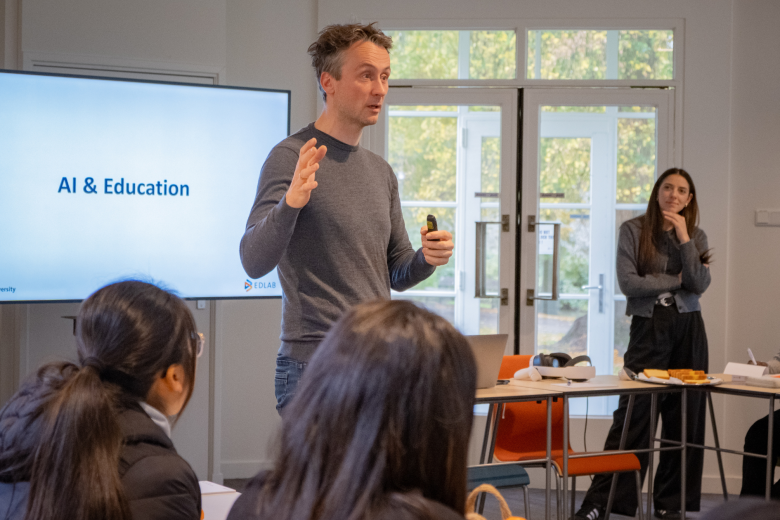Service robots: rising or falling stars?
In our society, intelligent robots have sometimes been portrayed as dangerous. In movies, we have seen images of robots taking over the world, and more recently, we often see claims in the media that robots are taking our jobs; however, robots are not necessarily the enemy. ‘Social robots’, a new breed of robots designed to engage with people and elicit an emotional connection, are currently being developed to help humans in all types of ways. This might include, for instance, helping children recover from physical injuries or inspiring nursing home residents to stay active.
In this article and video below, we provide you with a glimpse of the research being done at Maastricht University’s School of Business and Economics to study the impact of social robots on our society.
Exploring the good and the bad
For Professor Dr. Gaby Odekerken-Schröder and Professor Dr. Dominik Mahr, research, teaching, and social impact truly go hand-in-hand. Their research regarding social robots is unique because it focuses on the human aspects of robot-integration into service contexts — effectively, into our everyday lives. As a customer at Dadawan, an Asian fusion restaurant with three locations in The Netherlands, you can be greeted by Jaime, a robot concierge (who will take your temperature before seating you), and served by Amy, a robot waitress.
Although the benefits of using robots in restaurants during Covid-19 times may be easy to imagine, it is equally important to explore the flip-side in a nuanced manner. When, and where, do the benefits of robots outweigh their detriments, and vice versa? At what point does 'almost human' shift from being endearing to being eerie? When might relying on a robot for medication reminders actually be experienced as encouraging brain laziness?
Robot 'employees' function within a network that involves both human employees and human customers. It is therefore essential to study not only the implications of service robots for their human colleagues but also what customers can expect from robot service providers. The value of any experience is co-created — and also potentially co-destroyed — by the interactions, expectations, and evaluations, of those who participate in it. In fact, you are engaging in value co-creation (and perhaps also co-destruction) at this very moment! In examining such delicate considerations, the research utilizes study designs that allow for soliciting underlying feelings and emotions, and for the disentangling of underlying themes that may be driving human perceptions and behavior, in collaboration with service robots.
SBE leads the way with dynamic research group
Prof. Dr. Odekerken-Schröder and Prof. Dr. Mahr are the leaders of an international research group at the School of Business and Economics at Maastricht University. The group’s work was catalyzed in 2015 by its participation in the EU’s SDIN, Service Design for Innovation Network, and it has continued evolving in an organic manner ever since, with numerous cross-disciplinary, as well as international collaborations. Its unique research approach has earned special recognition from the Journal of Service Management, and the American Marketing Association. The group is dynamic and aims to include scholars with similar research interests, at all levels of academia.
In keeping with this integrative vision, master students at SBE are actively involved in the research, with two main objectives: first, to generate knowledge that will be useful for managers and policy-makers, and secondly, to train future professional trailblazers. Recent Strategic Marketing and Business Intelligence and Smart Services (BISS) student projects include: creating robot service innovations in healthcare facilities and restaurants, developing new technologies to facilitate service innovations, and performing market analyses to determine interest levels and applications with regard to service robot technologies in additional industries.
What is the impact of service robots in hospitality, healthcare, and during the Covid-19 pandemic? In this video, get a glimpse of some of the research being done on this topic at the School of Business and Economics, in collaboration with different industry partners.
Learn more about research in this field by reading these recently published articles:
- Odekerken-Schröder, G., Mele, C., Russo Spena, T., Mahr, D., Ruggiero, A. (2020). Mitigating Loneliness with Companion Robots in the COVID-19 Pandemic and Beyond: An Integrative Framework and Research Agenda. Journal of Service Management, ahead-of-print. https://doi.org/10.1108/JOSM-05-2020-0148
- Čaić, M., Odekerken-Schröder, G. & Mahr, D. (2018). Service robots: Value co-creation and co-destruction in elderly care networks. Journal of Service Management, 29(2), 178-205. https://doi.org/10.1108/JOSM-07-2017-0179
- Čaić, M., S. Holmlid, D. Mahr and G. Odekerken-Schröder, (2019). Beneficiaries’ View of Actor Networks: Service Resonance for Pluralistic Actor Networks. International Journal of Design, 13(3), 69-88.
- Čaić, M., Avelino, J., Mahr, D., Odekerken-Schröder, G. , Bernardino, A. (2020). Robotic Versus Human Coaches for Active Aging: An Automated Social Presence Perspective. International Journal of Social Robotics, 12, 867-882. https://doi.org/10.1007/s12369-018-0507-2
- Čaić, M., Mahr, D., & Odekerken-Schröder, G. (2019). Value of Social Robots in Services: Social Cognition Perspective. Journal of Services Marketing, 33(4) 463-478. https://doi.org/10.1108/JSM-02-2018-0080
- Čaić, Mahr, Odekerken-Schröder, Holmlid, Beumers (2017). Moving Towards Network-Conscious Service Design: Leveraging network visualisations. Touchpoint journal of service design, 9(1).
Also read
-
Shaping the future of marketing: SBE scholars at the forefront of research and teaching
Three faculty members from SBE’s Department of Marketing & Supply Chain Management, Prof. Dr. Dominik Mahr, Dr. Jonas Heller, and Dr. Tim Hilken, combine cutting-edge research with innovative teaching and mentorship. From exploring the societal implications of digitalisation in courses such as...

-
UWC Maastricht students get a taste of education innovation at EDLAB
On 21 October 2025, EDLAB hosted students from United World College Maastricht for the second year in a row, as part of their Youth Social Entrepreneurship programme.

-
Maastricht University ranked #3 worldwide and #1 in Europe in 2025 Better World MBA Ranking
We are incredibly proud to share that the MBA programmes of Maastricht University School of Business and Economics’ executive branches, MSM and UMIO, have once again been recognised among the very best sustainable business MBA programmes worldwide. In the 2025 Better World MBA Ranking by Corporate...
